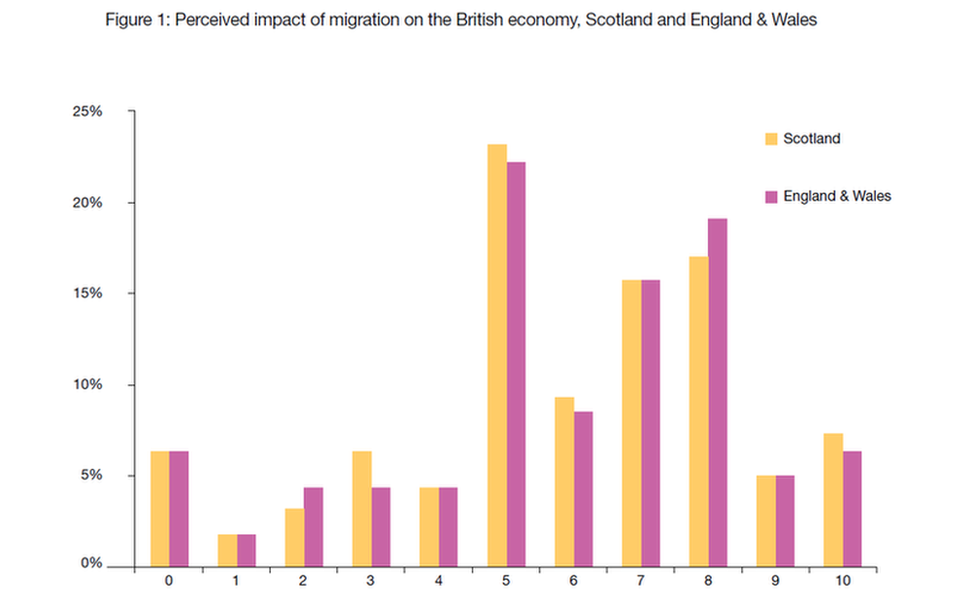Do Scots think differently about immigration?
- Published

When the UK voted to leave the EU, there was dramatic difference north of the border - with 62% of Scottish voters wanting to remain. Immigration was one of the big issues - so does the result indicate that Scots take a different view? Analysis by the ScotCen research team, written by Prof John Curtice and Ian Montagu, suggests the answer is more complicated.
Are Scots more favourable to immigration?
Researchers from ScotCen analysed data from their British and Scottish Social Attitudes surveys conducted in the latter half of 2017. Both carried the same two questions about attitudes to immigration, asking (on a scale of 1-10) if it was good or bad for the economy and if it enhanced or undermined Britain's cultural life.
The results indicated that Scotland appears to have a relatively positive view of the benefits of immigration - but it is no different in this respect from England and Wales.
No matter how respondents answered the questions, the pattern was broadly similar.

The authors write: "Far more people in Scotland think that immigration is good for Britain's economy (46%) than think it is bad (17%), but the figures are almost identical in England and Wales.
"Equally voters in Scotland are much more likely to feel that immigration enriches Britain's culture (43%) than to believe it undermines that culture (20%), but again in this they are little different from their counterparts in England and Wales."
What about demographic differences?

A number of previous studies have indicated that older people - especially those with few formal educational qualifications - are less likely to be favourable to immigration than younger voters and university graduates. Does that hold true in Scotland?
The answer they came up with was there is no major difference in respect of age.
They write: "While around half of those aged 18 - 34 (52%) and those aged 35 - 54 (50%) in Scotland view immigration as good for the economy, just 36% of those aged 55 and over believe this to be the case. The equivalent figures in England and Wales are much the same."
And education? The surveys suggest that 76% of university graduates in England and Wales think immigration is good for the economy, against 75% in Scotland. On the "cultural impact" question the same proportion (71%) thought it was a good thing.
There was a "slight suggestion" that those in Scotland without any qualifications are a little more positive about the consequences of migration, compared with the equivalent group south of the border.
Overall though, the ScotCen team found no glaring differences.
Where they did find a difference

The report indicates that how someone has voted in Scotland does have an association with attitudes to immigration.
"The SNP has gathered for itself an electorate that is relatively positive about immigration, an electorate whose views are then counterbalanced to some degree by a pattern of support for other parties in Scotland that is somewhat less positive towards migration than is found among those in England and Wales who back such parties," the authors write.
"Support for Scottish independence is associated with a more positive outlook too, even though on its own a strong Scottish identity is not. Meanwhile, because it secured considerable support from (less pro-immigration) supporters of unionist parties, the Remain campaign in Scotland was more successful than its counterpart elsewhere in Britain at securing the backing of those north of the border who do have less positive views about immigration."
Asked about the impact of migration on British culture, 28% of Conservative voters in Scotland said culture had been "enriched". The equivalent figure for Conservatives in England and Wales was 30%.
Among Labour supporters, 45% in Scotland saw culture as being "enriched", with 56% of Labour supporters in England and Wales giving the same response.
For Liberal Democrats, the figure was 52% in Scotland and 64% in England and Wales.
No comparison of this kind was possible for SNP voters. But their response to the same question indicated that 57% believed culture had been enriched by migration.
The authors comment: "The fact that those who back Scotland's largest party, the SNP, hold relatively positive views about migration helps create the impression that Scotland as a whole does so as well.
"However, we have seen that the relative success of the SNP in securing the support of those with positive attitudes towards migration is counterbalanced by some tendency for those who back one of the other three main parties in Scotland to be less positive about immigration than those who support those parties in England and Wales."